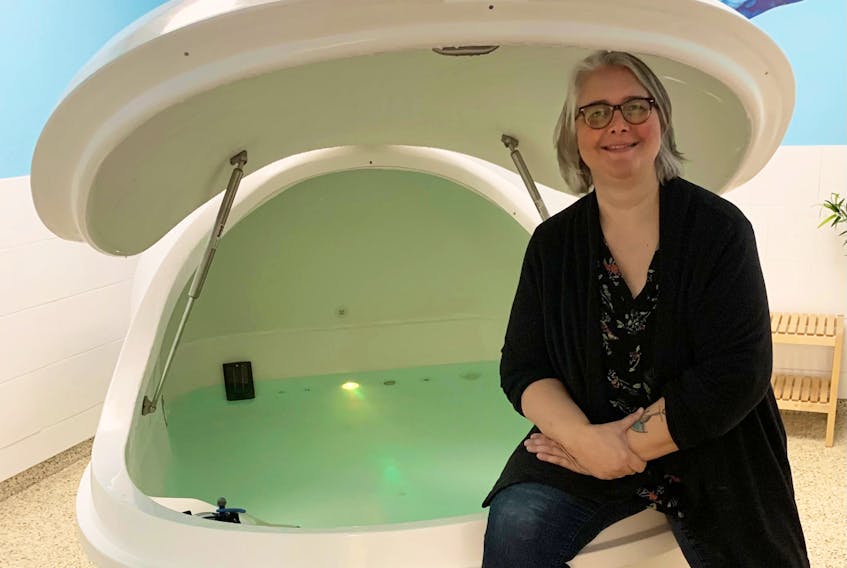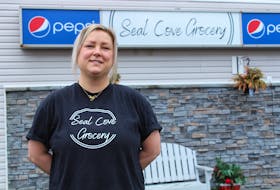Amid the massage therapists and acupuncturists – and soon an osteopath - in the Antigonish Wellness Collective’s home overlooking Chisholm Park, there’s a business with things that look like they stepped out of a sci-fi movie.
Floatation pods.
Shiny, white and shaped like elongated eggs, these are soundproof tanks filled roughly knee-deep with extremely salty water. The idea is to step into the body-temperature water, lay down and float like a cork. Closing the lid blocks out all light and sound.
Amanda Maginley started this business last December with a capital investment of $125,000. Her start-up costs might have been a lot higher, but she picked up used float pods for $10,000 apiece, saving her roughly $70,000 off the cost of buying similar equipment new.
Her landlord put up the walls to separate her business’ space from that of the other five in the wellness centre. But it fell on Maginley to design and pay for the costs of converting the inside of that space to accommodate float pods. Lots of plumbing.
She also had to buy the Epsom salt to go into those tanks. A lot of it. It came by the pallet and the price tag for that first order of salt alone was $1,600. The float pods each contain 600 lbs. of Epsom salt.
The investment seemed to pay off.
Strong start
Within a few weeks of opening, Nepsis Floatation was serving 13 customers per day, each one of them paying between $55 and $65 for a session.
“I was doing really, really well. I hit the ground running,” says Maginley. “I was able to pay my bills and a small dividend. This is a town that has a university and a hospital so I had a lot of support. “There are over 30 massage therapists here and they are all fully booked. This is a place where people really take care of themselves.”
Then, COVID-19 hit. In mid-March, Maginley had to shut down for the duration of the pandemic-mandated lockdown, re-opening only in June. But many people were suddenly wary of using the float pods, still a relatively new wellness trend in Antigonish, for fear of catching the coronavirus.
“There’s not a lot of knowledge about floatation in this area and I was dealing with that,” says Maginley.
The Epsom salts used in the float pods are touted in the Farmers’ Almanac as an effective natural face cleaner because of their antibacterial, antifungal, and antiviral properties. There is scientific research that bears out the popular claim that Epsom salts kill bacteria.
And, in addition to the heavy use of Epsom salts, Maginley has put in place a thorough cleaning regime.
“I clean the inside of the walls of the floatation pods with a chlorine and water solution and wipe it off and I also do the high-contact areas,” she says. “There are six levels of cleanliness in the pods and, as for the outside, there are three.”
It takes her an hour each time. Despite all that cleaning and the need to social distance and wear face masks, business is now back up at Nepsis Floatation.
“I’m finally back to where I was before COVID. I’m not expecting December to be as good as it was last year but November was better than any other month since last January,” says Maginley.
Becoming a believer
A single mother, Maginley struggled for years – doing as many as four jobs at the same time – to raise her two autistic children before enrolling in the social services program at Nova Scotia Community College five years ago at the age of 44.
While she was there, she heard about floatation therapy and decided to try it to see how it might benefit her children. The results made her a true believer.
“Within six months, I had a call from the school. They wanted to talk to me about my son,” says Maginley. “They thought I had put him on medication and wanted to know what kind. He was rested. He could suddenly focus for longer periods of time. And his mood had improved.”
According to her, floatation therapy lowers the level of cortisol, the body’s stress hormone, and boosts the brain’s levels of dopamine, a neurotransmitter that plays a role in how people feel pleasure.
After graduating from NSCC with the college’s alumni award, given for outstanding academic achievement and making a difference in other people’s lives, Maginley got to work to make Nepsis Floatation a reality.
When the lockdowns took hold, she availed herself of Ottawa’s Canada Emergency Commercial Rent Assistance (CECRA).
Maginley paid her full rent up front throughout the lockdowns and was reimbursed about $8,000 under CECRA.
Since then, the fledgling entrepreneur has cut back on her costs by renting out some of the space she had planned to use for another floatation room to an acupuncturist.
“I’m charging $500 per month,” she says. “I have some space I’m not using, so I might as well rent it out.”
Maginley has also availed herself of the $40,000 interest-free Canada Emergency Business Account loan. Under that program, up to 25 per cent of that loan does not need to be paid back provided the borrower pays it back by the end of 2022.
An additional $20,000 interest-free loan will soon be available under that program. It too forgives $10,000 of the loan if it is paid on time.
Even though Nepsis Floatation is currently breaking even, Maginley is using all of the COVID-19 assistance offered by Ottawa to help the business ride out any possible future lockdowns.
“I’m expecting to have to close down again,” she says. “That’s why I’m reaching out with the $40,000 loan so that I can ride it out.”
The Pivot is a regular business feature about an Atlantic Canadian company adapting to new market realities with innovative products, services or strategies. To suggest a business for The Pivot, please e-mail: [email protected].









